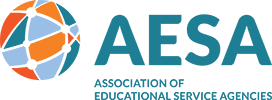
ESAs certainly do make a difference in many different ways, all over the United States, and significantly impact the nation's educational system. Here, we capture just a few stories about the high-impact services delivered by ESAs nationally. Feel free to share these stories with others, and if your ESA has a story to share, please contact Joan Wade, AESA Executive Director at jwade@aesa.us.
Working Together To Change The Law
It takes time, perseverance, and a lot of teamwork to change the law.
Just ask Dan Mayer, executive director of BOCES 5, an educational service agency in Wilson, Wyoming. Years of work by Mayer and others came to fruition this year when the Wyoming State Legislature approved a bill that made BOCES 5 and the other BOCES in the state eligible to apply for and receive state and federal grant money. Governor Mark Gordon signed the bill into law on February 24.
“It’s quite an accomplishment,” Mayer said. “It’s been a real team effort. We were able to bring some collaboration in areas where there hadn’t been.”
The process started shortly after Mayer came to BOCES 5 in 2016. BOCES 5 serves 13 school districts and operates five therapeutic day schools and a therapeutic residential school for students whose behavioral and emotional needs cannot be met in a traditional classroom setting. Five of the schools serve students from specific areas of Wyoming and offer individualized instruction to meet their needs. However, C-V Ranch is a public therapeutic residential school that provides educational programming, therapy, and vocational development to students across Wyoming, as well as out of state.
The need for these types of services has expanded over the years and the need for additional funding to support operations became clear. When Mayer investigated applying for state or federal grants, he discovered the BOCES were not eligible because they were not designated as Local Educational Agencies or LEAs under state law.
The amount of money involved can be considerable. In 2010 under the Affordable Care Act healthcare reform bill, $38 million was available to Wyoming schools but the BOCES were not eligible because they were not LEAs.
Initial attempts to make a change through presentations to the Wyoming Department of Education were unsuccessful. There was resistance from many public school district leaders who were concerned that allowing BOCES to be eligible for federal and state grants might take money away from their districts and students.
In September 2020, Mayer and the BOCES 5 Board resolved to launch a campaign to change the law since the state Department of Education had not supported their efforts. In Colorado, a similar effort by BOCES there had changed the law to make ESAs eligible for state and federal funding.
Wyoming State Representative Albert Sommers was sympathetic to efforts to change the law. Sommers was familiar with the work done by BOCES 5 and had visited C-V Ranch.
However, a bill sponsored by Sommers to designate BOCES as LEAs was not taken up by the state legislature the first time it was introduced
Mayer and the other BOCES tried again. This time they went directly to local school districts to explain why the change in law was needed. Mayer also made a presentation to the legislature’s joint education committee and worked with the Wyoming School Boards Association to get a resolution passed supporting the change.
In January 2023, a bill to designate BOCES as LEAs was introduced in the Wyoming House of Representatives. It passed the House with strong support and was taken up by the State Senate where it faced some challenges. Although it initially passed the Senate, it was rejected by a two vote margin on the third reading.
Later that day, it was re-introduced and passed by two votes, and then sent to the Governor.
BOCES 5 has not yet used its new authority to apply for state or federal grants although staff are researching the possibilities. In particular, they will be looking for grants that could help defray operational costs such as maintenance, technology, and infrastructure.
Mayer has advice for educational service agencies in other states interested in changing the law to make them eligible for federal or state grants. He suggests:
- Commit to a long-term process
- Seek out legislators who are interested in the issue
- Be persistent and keep the focus on the main idea and the facts
- Work with local school districts to educate them about the financial issues involved
- Understand the arguments from the opposition and be prepared to dispute them
